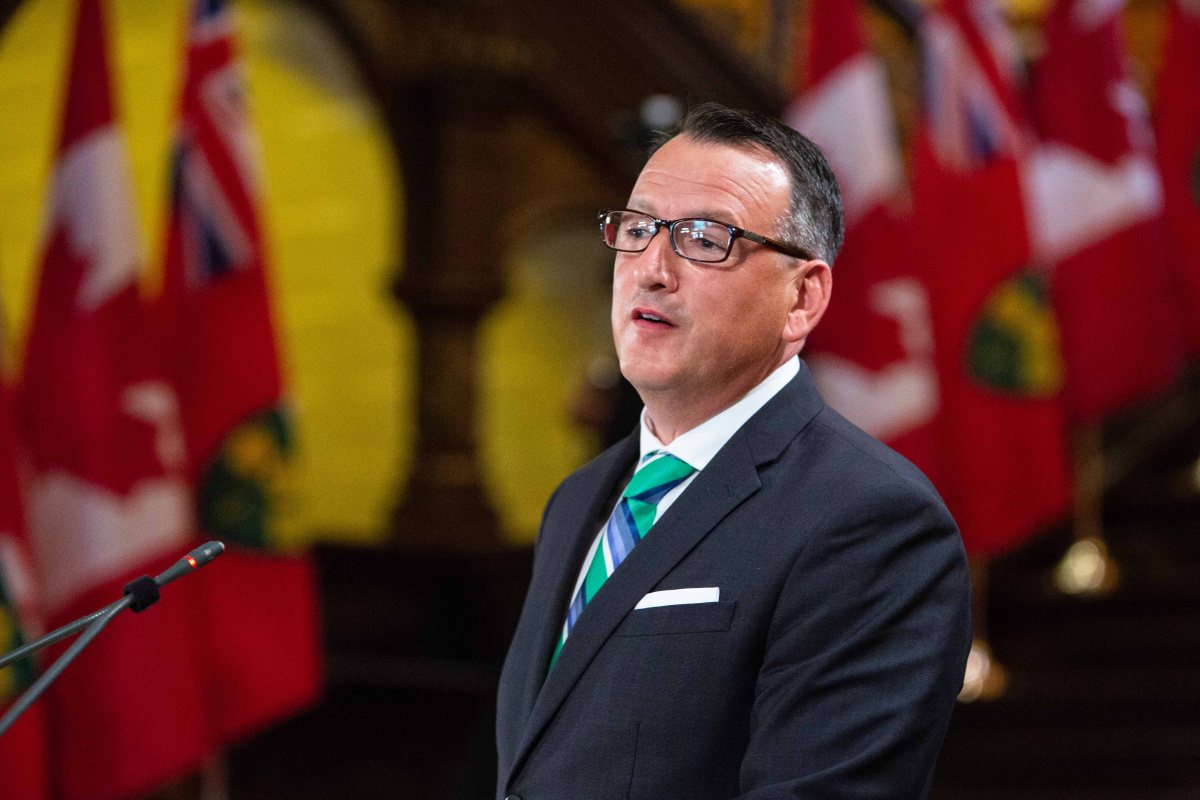Support strong Canadian climate journalism for 2025
Renewable energy supporters in Ontario are countering claims by a senior member of Premier Doug Ford's cabinet that their wind, solar and hydro projects are "unnecessary and wasteful."
Last week, Minister of Energy, Northern Development and Mines Greg Rickford slapped the label on 758 renewable energy contracts across the province, in a sweeping announcement that each of those contracts would be cancelled to save money on residents' hydro bills.
A variety of clean energy initiatives were put on the chopping block, including solar rooftops on schools, libraries, community and municipal buildings, biogas and wind power installations for farms, and hydroelectric dams. The complete list was released late last Friday.
According to Janice Ashworth, general manager of the Ottawa Renewable Energy Co-operative (OREC), the clean energy cuts are disappointing, but unsurprising. The co-operative lost two solar farm contracts in the cancellations, along with two solar rooftop projects for schools in Ottawa it had co-financed with Conseil des écoles catholiques du Centre-Est, Ontario's largest French-language school board.
"An important message is that renewable energy, over the past decade — especially solar — has become very cost effective," she told National Observer in an interview. "And it’s very shortsighted for the province to cancel these projects because the rates that are being paid under the last round of contracts, the ones that were all cancelled, were actually very competitive with grid rates."
A government representative could not be reached for comment on this story, after several days of repeated requests by phone and email.

Critics question government claim on savings
The new cancellations apply to renewable energy contracts between Ontario's Independent Electricity System Operator and a variety of suppliers across the province, under the 2009 Feed-in Tariff program and the 2014 Large Renewable Procurement initiative. Both initiatives were created by successive Liberal governments in Ontario in an attempt to encourage greater use of the province's renewable energy sources and build a more sustainable, diversified energy system.
According to the cancellation orders, signed by Rickford, the clean energy contracts have "contributed to cost pressures facing electricity consumers across all sectors of the economy." In a news statement last Friday, he said shuttering all the contracts that have not yet reached critical development milestones will help save $790 million for hydro ratepayers.
"We clearly promised we would cancel these unnecessary and wasteful energy projects as part of our plan to cut hydro rates by 12 per cent for families, farmers and small businesses," said Rickford. "In the past few weeks, we have taken significant steps toward keeping that promise."
Queen's Park has yet to confirm how much the cancellations will cost Ontario taxpayers, but Rickford vowed to propose a legislative amendment that, if approved, would protect residents from any costs incurred as a result of terminating the contracts. The $790 million in savings is an accurate figure, he added, even with those costs.
But without a detailed breakdown of the numbers from the Ontario government, renewable energy supporters are questioning Rickford's math, along with the claim that the renewable energy contracts are an undue burden on taxpayers.
Ashworth of OREC said each renewable energy project can claim up to $250,000 in termination fees or reimbursements under a special clause in their contracts, while Sarah Petrevan, senior policy advisor for Clean Energy Canada, said the cuts could result in a loss of jobs.
"You have to remember that renewable energy companies are businesses," she explained. "They employ people and create jobs, much like any other business, and when you take away stability and predictability in the things that they need to have a successful businesses, then they will migrate to the jurisdictions where they can do business successfully."
In the long run, Ashworth added, solar energy also has the cost advantage of being able to offer fixed, long-term rates — as opposed to sourcing power from fossil fuels, whose rates vary with the market.

Solar supporters undeterred
"I think it’s a lot of political jockeying, it’s always one party pitted against the other party’s sort of platform mainstays, I suppose," said Ashworth. "It’s unfortunate that renewable energy has become one of those lightening bolt items, or pillar items for the political debate we’ve been having."
She said it's disappointing Ontario has given up leadership on the renewable energy file, but OREC is not discouraged:
"(The cuts) will certainly make the focus, for the next four years, I would say on net metering. The good news there is that there's lots of opportunity within the net metering spectrum."
Net metering is the process of sending electricity generated from renewable energy sources — through the installation of solar panels on a home, for example — to the local utility in exchange for a credit towards one's monthly electricity costs.
Robert Maxwell, manager of corporate energy initiatives for the City of Toronto, agreed that the cancellations will speed up the transition to net metering. The City of Toronto lost six contracts to the latest announcement, for solar rooftops on a library, a garage, a paramedic station, and three sports facilities.
The municipality, he added, has a portfolio of about 100 solar installations that "we will go ahead with in any event." He said he "respectfully disagree(s)" with the Ontario government's claim that the cancelled contracts are wasteful.
"I think that in a short amount of time, the Feed-in Tariff program succeeded in spurring the development of a very large and productive industry creating thousands of jobs," Maxwell explained in a phone interview.
"For the City of Toronto, the impact is not enormous. We had six projects cancelled — three of those we had already determined we were not going to proceed with (because) there were technical issues... but again, we’re civil servants, we soldier on."
Ford campaigned on an promise to cut Ontario hydro bills by 12 per cent if he won the June election, using a variety of measures that would scrape $173 off the top of the annual average hydro bill.
Last week's announcement follows other cuts to Ontario's climate-friendly agenda, including a plan to withdraw from a cap and trade program with Quebec and California, and to resist the federal government's carbon tax scheme.
The Trudeau government has said these actions indicate Ontario's departure from a national climate change strategy. In response, Ottawa said it would review nearly $420 million in transfer payments meant for projects that reduce pollution. Prime Minister Justin Trudeau has also said he would take steps to impose a price on carbon pollution in Ontario, while returning revenues directly to the province's population —with or without Ford’s support.






Comments
The Trumpesque move by Doug Ford has ruffled the feathers in Ottawa. Like financing the 65-year old Kinder Morgan pipeline, Trudeau and his entourage are going to jam their policies down throats of the Canadian public, including Doug Ford's throat, by joking off transfer payments to Ontario. Any strategist should have seen something like this coming.
The King in Ottawa has spoken, with less than 40% of the vote in the federal election, so buckle up Ontario, the ride isn't over. And the loose change in our pockets is slowly disappearing, as temperatures keep rising.
The eternal problem with the "science" of economics is that it is based on assumptions - using data from the past to extrapolate future behaviours. All the algorithms in the universe cannot compensate for the unaddressed falsity of the underlying assumptions.
The best thing the feds can do is send each Ontario resident a cheque, redistributing the revenue obtained in the province through the federal carbon tax. Despite the small increase in gasoline and other prices, most residents will discover that they are coming out ahead.
One wonders: is Ford ignorant, or in the pocket of fossil fuel interests, or both? Regardless, he is working hard to set back the economy of Ontario, and Canada with it, as the world moves to cleaner fuels. A lack of conscience toward our children and grandchildren must underly all of these short-sighted and uninformed decisions. Acting on fact and conscience shouldn't be a left-right issue, but it seems like some Canadian Conservative governments have a knee-jerk reaction against any form of energy less damaging than oil and gas.
Doug Ford is the new leader of the new "Regressive" Conservative Party of Ontario.